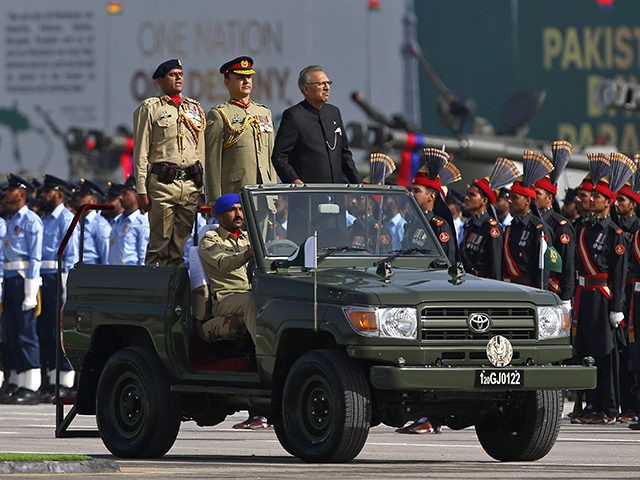Pakistani President Arif Alvi claimed Monday that the government of India is training and financially supporting terrorists in Afghanistan so they can carry out attacks in Pakistan.
Alvi made these allegations while meeting with visiting Turkish General Umit Dundar. He also reportedly complained to Dundar about India’s control over the contested Kashmir region, a perennial sore point between India and Pakistan, and accused India of illegally trading in uranium.
“India is using Afghan soil for terrorism in Pakistan by providing training and funding to militants,” Alvi told reporters on Tuesday.
Alvi evidently built his terrorism theory upon India’s alleged involvement in the June 23 bombing in Lahore in eastern Pakistan. The car bomb attack, which killed three and wounded 24, occurred near the home of Hafiz Saeed, the imprisoned leader of notorious Islamist terrorist group Lashkar-e-Taiba (LeT). Some of the bombing victims were Pakistani police officers manning a checkpoint near Saeed’s residence.
Saeed and LeT are no friends of India, having perpetrated the horrific Mumbai massacre in 2008. India, and the United States, have criticized the Pakistani government for not taking sterner measures against LeT. Saeed is currently serving a 15-year sentence for terrorism financing. He was purportedly not at home when the Lahore bombing occurred, but his exact whereabouts have not been disclosed.
Pakistani officials are increasingly firm in accusing India of masterminding the Lahore bombing.
“We have identified the main mastermind and the handlers of this terrorist attack, and we have absolutely no doubt or reservation in informing you that the main mastermind belongs to RAW, the Indian intelligence agency, is an Indian national and is based in India,” Pakistani National Security Adviser Moeed Yusuf declared on Monday.
Yusuf said India launched “thousands of coordinated cyberattacks on our investigation infrastructure” to disrupt Pakistan’s investigation of India-sponsored terrorism networks.
Pakistani police officials say the perpetrators of the Lahore bombing have been arrested. The conspirator who parked the explosives-laden vehicle at the site of the attack was identified as an Afghan national living in Pakistan.
Pakistani Prime Minister Imran Khan echoed President Alvi’s charges, stating that the “planning and financing” of the Lahore bombing “had links to Indian sponsorship of terrorism against Pakistan.”
“The global community must mobilize international institutions against this rogue behavior,” Khan said on Twitter.
Pakistani Foreign Minister Shah Mahmood Qureshi said on Monday that India’s “continuous terror-financing to create unrest in Pakistan” would be taken up with the United Nations and international watchdog organizations like the Financial Action Task Force (FATF).
“Is it not a responsibility of the FATF to hold India accountable for its terror financing? If any action is not taken, then it will show dual standards,” Qureshi said, alluding to FATF’s investigations of terrorism financing in Pakistan.
Qureshi said a “dossier” filled with “clear evidence of Indian terrorism” has already been submitted to the United Nations.
For its part, India accuses Pakistan of conducting terrorist attacks against it, including an incident Sunday night in which two armed drones carrying heavy explosive charges struck an Indian Air Force station at a civilian airport in the Jammu-Kashmir region.
Indian officials said their preliminary investigation indicates the drones were launched by LeT, which they accuse the Pakistani government of supporting as a proxy to conduct terror attacks against India.
The Indian military described the Jammu drone strike as a significant escalation, warning that Pakistani-supported terrorist groups are using increasingly sophisticated drones to exploit admitted weaknesses in India’s anti-drone defenses.
The Times of India (TOI) said “many would see the Jammu attack as retaliation for the bomb attack in Lahore.”
TOI and other sources noted rumblings in India that the drone strike could be construed as a violation of the ceasefire agreement between India and Pakistan in the Jammu-Kashmir region, potentially representing a threat severe enough to warrant pre-emptive Indian airstrikes into Pakistani territory.
TOI also derided the Pakistani foreign minister’s efforts to launch an FATF investigation of India as hollow grandstanding and a cynical attempt to distract the watchdog organization from its program of monitoring terrorist financing in Pakistan.

COMMENTS
Please let us know if you're having issues with commenting.